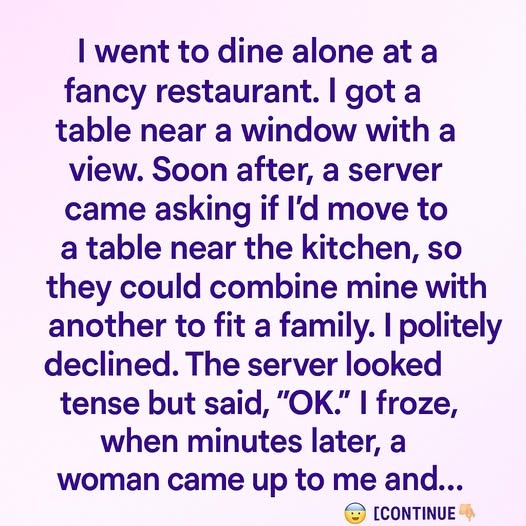
I almost didn’t go that night. Work had drained me dry, and the idea of sitting alone at a restaurant felt exhausting — maybe even embarrassing. Takeout and Netflix in bed sounded easier, quieter. But something small and stubborn inside me whispered: dress up, go out, treat yourself like someone worth showing up for. So I did.
The restaurant glowed like a little greenhouse on the corner, filled with laughter and warm light. “Reservation for one,” I told the host, my voice steadier than I felt. He led me to a small table by the window — perfect view, soft music, candlelight flickering across the glass. I ordered a glass of wine, a salad, and the halibut the menu promised would “change your perspective on fish.”
It felt strange at first, sitting there alone. Everyone around me seemed paired up or grouped in happy clusters — couples laughing over shared appetizers, families clinking glasses, friends taking photos. My instinct was to shrink, to scroll through my phone, to pretend I wasn’t really alone. But then I caught my reflection in the window — calm, collected, present — and decided to just… sit. To be.
A few minutes later, my server returned with an apologetic smile. “Would you mind moving tables?” he asked. “We have a large family who’d like to combine these two spots.”
The old me would’ve agreed instantly. I’d have smiled, apologized for existing, and moved without thinking. But that night, something stopped me. Maybe it was the exhaustion of constantly making space for everyone else. Maybe it was the quiet defiance that comes with realizing you deserve comfort too.
“I’d like to stay here,” I said.
He blinked, surprised. “Of course,” he said quickly. But as he walked away, guilt twisted in my chest. I could almost hear my own thoughts berating me — Don’t be difficult. Don’t take up space.
Then a woman approached my table. “I’m the mother of that family,” she said softly. “I just wanted to thank you for not moving.”
I stared, confused. “Thank me?”
She smiled. “Yes. I want my kids to see that a person dining alone is still a person — not someone to pity, but someone confident enough to sit by themselves. You showed them that tonight.”
Her words melted the shame right out of me.
The halibut arrived not long after — tender, buttery, perfect. I savored every bite, the simple pleasure of eating slowly, without conversation, without performing. Toward the end of my meal, the woman’s daughter, maybe six years old, tiptoed over and handed me a small crayon drawing. It was the restaurant window, with a stick figure — me — smiling at a glowing yellow table. “That’s you!” she said proudly.
My throat tightened. I thanked her and tucked the drawing into my purse like a treasure.
A few moments later, my server reappeared, setting down a small lemon tart. “Compliments of the kitchen,” he said. “For perspective.” There was a hint of apology in his tone — or maybe respect. Either way, it made me smile.
When I left, the host stopped me. “Thank you for coming,” he said quietly. Then, almost shyly, he added, “My mom eats out alone a lot. I think she’d like this story.”
I walked home under the streetlights, the night cool and clear, the city humming around me. At home, I pinned the little girl’s drawing to my mirror. It wasn’t perfect — the lines were uneven, the colors bright and clumsy — but something about it felt profound. It captured what I hadn’t realized I’d learned that evening.
Being alone isn’t a sign of being unwanted or forgotten. It isn’t an apology. It’s not something to rush through or disguise with your phone. Being alone can be an act of respect — for yourself, for your peace, for your place in the world.
That night taught me something simple but powerful: solitude doesn’t have to feel like absence. It can feel like presence — deliberate, grounded, full. You can sit at your own table, eat your own meal, hold your own space, and know that it’s enough.
Since that evening, I’ve gone out alone more often — to cafes, movies, art exhibits. At first, I felt people’s eyes on me. But I’ve come to understand that most of what I imagined was judgment was just reflection — the world noticing someone who isn’t rushing, who isn’t filling every silence. Someone who’s learned to stay seated.
Now, when I see others dining alone, I don’t feel pity. I feel admiration. I think of the woman who thanked me, the child’s drawing, the quiet dignity of that moment. I think of how much power there is in simply saying, “No, I’ll stay right here.”
The truth is, solitude can be a mirror — one that shows you not who you’re missing, but who you are when no one’s watching.
That night, as I fell asleep, I felt something inside me unclench — a tension I didn’t know I’d been carrying. For once, I wasn’t wishing for company, approval, or distraction. I was content, full in a way that had nothing to do with food.
Sometimes, holding your seat is the bravest kind of yes. And sometimes, dining alone isn’t lonely at all — it’s liberation.